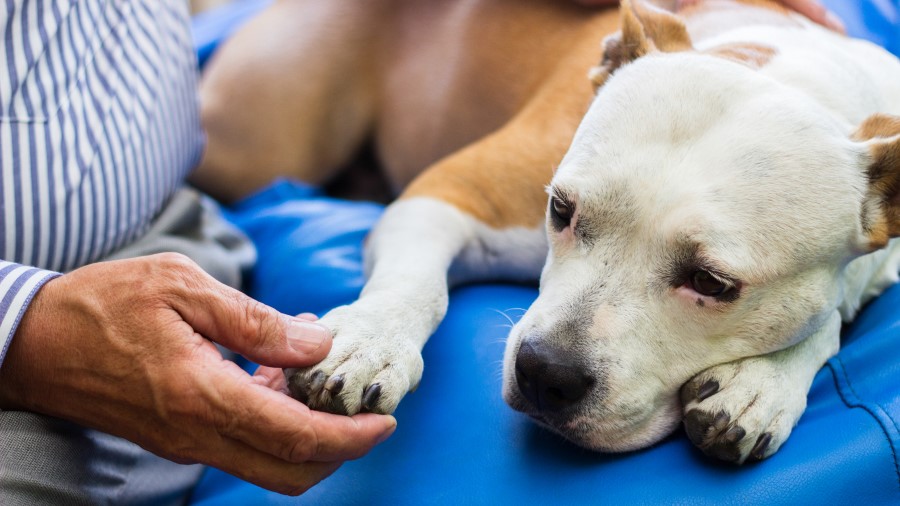Australia has some of the world’s most poisonous animals. One that poses a threat to our pets and our wildlife is the cane toad. Cane toads are most prevalent in the warmer months, although in tropical north Queensland they are present all year round.
The giant tropical cane toad was introduced to Australia to control the sugar cane beetle and has become a major pest in tropical areas. The toads excrete a potent and rapidly acting toxin from glands around the neck area. The effects of the toxin are hallucinogenic.
Cane toad poisoning in cats is rare. They seem to be more aware of the risks. Poisoning in dogs is more common, especially in puppies and terrier breeds as they find the movement of toads irresistible.

How does cane toad poisoning in dogs occur?
Cane toad poisoning in dogs occurs when a dog bites or licks a toad, the toxin is released from glands behind the neck and sticks to the gums and tongue of your pet. The toxin is rapidly absorbed across the membranes of the mouth. Symptoms depend on the amount of toxin absorbed and the length of time from when the pet was exposed to the toxin. Initially, pets will drool or froth, and potentially develop muscle tremors which progress to seizures and possibly cardiac arrest.
Signs of cane toad poisoning in dogs
There are a few symptoms of cane toad poisoning in dogs you could expect to see. These include:
- profuse salivation, drooling and/or frothing from the mouth
- very red and slimy gums
- pawing at the mouth
- vomiting
- disorientation
- shivers and/or tremors
- muscle rigidity or spasms
- convulsions or seizures
- very rapid heart rate and/or heartbeat irregularities
- death
First aid measures
If you think your pet is experiencing cane toad poisoning and they display any of the symptoms listed above, these are some first aid measures you can follow to help them:
- Call your Greencross Vets clinic or your local Vet Emergency Care and advise them of the toad poisoning incident
- Using a wet cloth, gently and thoroughly wipe the inner surfaces of the mouth, that is the gums, tongue, and roof of the mouth as well as the outer surfaces of the mouth for 10 to 15 minutes, rinsing the cloth out after each wipe
- Washing of the mouth with a hose or tap is not recommended due to the possibility of water entering the lungs
- After this time, transport your dog for veterinary assessment. If you have multiple people with you, you should get a passenger to continue wiping out your pet’s mouth as described previously.
If your dog is exhibiting signs of toxicity as previously listed, more than just salivation, then it would be safest to take them straight to an emergency vet so they can be seen as soon as possible. Again, if multiple people are present, continue wipining out your pet’s mouth as described above in transit.
If your dog is unconscious or seizuring then do not attempt to wipe the mouth, just take them straight to an emergency vet, calling them en route.
When to seek veterinary attention
In mild cases, these first aid measures is all that will be necessary, but you should watch your pet carefully for a few hours after contact with the toad. If there is any worsening of symptoms, such as disorientation, shivers, tremors or muscle stiffness, you should seek veterinary help immediately. Contact your local Greencross Vets if you suspect cane toad poisoning in your pet.
Cane Toad Poisoning FAQs
How long does cane toad poisoning take in dogs?
In general toxic effect signs can be seen within 30-60 minutes of contact, however, the amount of time it takes for dogs to start showing symptoms can vary depending on the amount of toxin they have ingested. This time frame can span anywhere between several minutes to hours, so it’s important to keep a close eye on your dog if you suspect they may have come into contact with a cane toad and always seek veterinary assessment.
How long can cane toad poisoning last in dogs?
Cane toad poisoning can result in mild reactions or progress to very serious symptoms depending on the amount of toxin your dog has ingested from a cane toad. The effects of cane toad poisoning can vary and the length of time it takes to completely rid of the toxin will depend on numerous factors, like the size of your dog or the amount of toxin they have ingested, so it’s important that if your dog is showing symptoms that you seek veterinary advice.
How is cane toad poisoning treated?
There is no specific antidote for cane toad toxin so treatment is focused on decontamination, by removing as much toxin as possible from the mouth, and if already absorbed and symptoms present, supportive care is provided by your vet, supporting the body by providing IV fluids to clear the toxin as quick as possible and manage any side effects the toxin has caused such as heart, respiratory or neurological signs. Immediate treatment of flushing the mouth as described above is the best thing that can be done at home followed by contacting your vet and taking your dog to them, where they can provide further care if needed.
Can cane toad poisoning kill dogs?
If enough of the toxin is absorbed, cane toad poisoning can result in death, which is why it is important to treat your dog immediately and seek veterinary assessment.
What happens if my dog eats a cane toad?
Eating a cane toad will result in the toxin absorbing much quicker than just licking, so if your dog has bitten or consumed a cane toad, it is essential that you take them to a vet immediately.
What to do if you see a cane toad in your backyard
If you are aware of cane toads in your backyard, you should first ensure any pets or children do not access the area or come into contact with them. As cane toads are classified as a pest and a threat to Australia’s ecosystem, you may wish to humanely euthanise any cane toads you may find in your backyard. If you are unsure or need assistance with this, you can contact your local council to get appropriate contacts for cane toad removalists to get rid of the toads for you.

 Greencross Vets
Greencross Vets 












